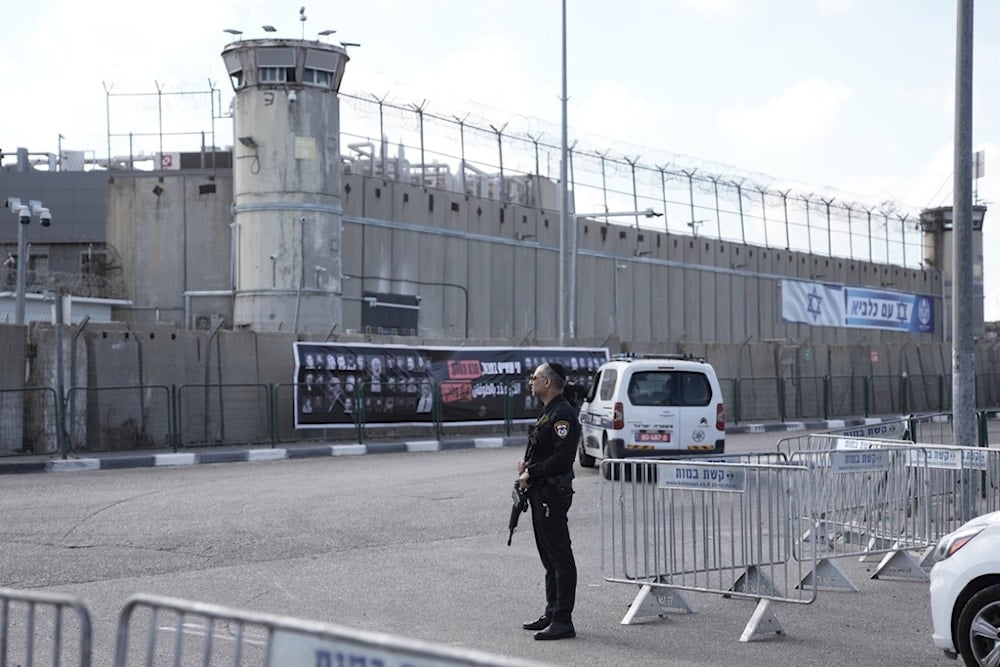Palestinian prisoners face abuse and starvation in Ramla prison
Palestinian prisoners in the Israeli Ramla prison face starvation, torture, and religious bans as rights groups call for action
-

An Israeli police officer stands outside Ofer military prison near occupied al-Quds, Monday, October 13, 2025. (AP)
The Palestinian Prisoners’ Media Office has revealed harrowing conditions faced by Palestinian detainees in the Rakevet section of the Israeli Ramla prison, describing a systematic campaign of starvation, torture, medical neglect, and humiliation, particularly targeting prisoners from the Gaza Strip since October 7, 2023.
According to testimonies obtained by the office, prisoners are subjected to harsh measures that include “starvation, medical negligence, beatings, and continuous insults.”
The office reported that the Israeli prison administration has also banned Friday prayers, and at times even individual prayers, while prohibiting detainees from possessing Qurans. The statement described these measures as “a flagrant violation of their religious and human rights.”
Torture and neglect of prisoners
One prisoner, identified as (A.M.), has reportedly lost more than 10 kg and suffers from fungal infections with no medical treatment, after what the office called “brutal torture during interrogation.”
Another detainee (I.H.) lost around 35 kg and developed severe skin conditions caused by neglect and poor hygiene. Despite the deterioration of his health, his administrative detention was extended “without any genuine charges,” the report said.
The Palestinian Prisoners’ Media Office said that the testimonies “reflect a deliberate escalation in the Israeli occupation’s policy of repression, starvation, and solitary confinement” against detainees, noting that these practices have become increasingly severe over the past year.
The office held the Israeli prison administration “fully responsible for the worsening conditions and the lives of Palestinian prisoners,” urging the International Committee of the Red Cross and the UN Human Rights Council to take “urgent and effective measures to stop these grave violations.”
'Hostages without human rights'
Freed Palestinian journalist Shadi Abu Sido revealed harrowing details of torture and abuse inside Israeli prisons, describing Palestinian detainees as “hostages without any human rights” in an interview with Al Mayadeen on Saturday.
Abu Sido recounted his personal suffering during his 20 months of detention in Sde Teiman and Ofer prisons, saying the conditions amounted to systematic psychological and physical torture. “We were deprived of sleep for days,” he said, adding that he endured “100 consecutive days of shackling, with both hands and feet bound.”
He recalled moments of psychological torment, saying: “In the cell, the jailer told me that they had killed my family and children and destroyed my home.”
Abu Sido warned that detainees in Israeli prisons “are subjected to sexual assault,” emphasizing that the abuse represents a severe violation of human rights conventions.
Pattern of abuse in Israeli prisons
His account follows similar testimony from another freed Palestinian detainee, Mahmoud al-Arida, who told Al Mayadeen on Friday that prisoners continue to face “inhumane and degrading treatment” under the supervision of Israeli prison authorities.
Al-Arida, one of the architects of 2021's Operation Freedom Tunnel, confirmed that Israeli occupation officials, including far-right Police Minister Itamar Ben-Gvir, have personally inspected prisons such as al-Naqab, demanding harsher measures against detainees.
Al-Arida, in an interview for Al Mayadeen, detailed the severe abuse and torture Palestinian detainees face in Israeli prisons, recounted breaking out of Gilboa Prison along with his comrades under Operation Freedom Tunnel, and made a powerful call for solidarity with the Palestinian cause.
Al-Arida confirmed that all means of communication were completely cut off and that the detainees involved in Operation Freedom Tunnel - the 2021 prison break from Gilboa Prison - were isolated from the other detainees to prevent any information from getting out.

 4 Min Read
4 Min Read










